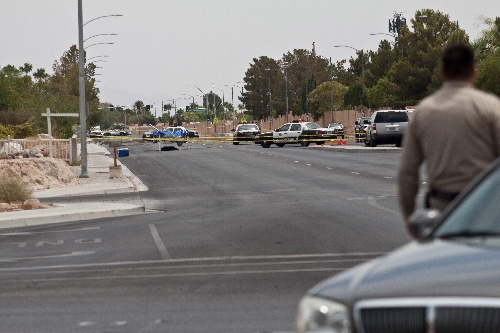Chimps’ escape raises questions on wild animal safety in county
When chimps named Buddy and C.J. escaped recently in a northwest Las Vegas neighborhood and a police officer shot and killed Buddy, it grabbed national headlines.
Their escape also dragged up an old local question: Does Clark County maintain the proper oversight over exotic animals, and can it keep the public and the animals safe?
The county treats keeping exotic animals as a land use issue rather than a question of whether a person is qualified to keep the animals.
Fourteen properties in the county have permits for wild animals. Seven are also licensed with the U.S. Department of Agriculture, which inspects them about once a year.
The other half are generally only inspected by Clark County Animal Control before their land-use permits are issued or renewed. Two to five years can pass between checks on owners of lions, tigers and small primates.
Over the years, officials have discussed tighter controls. In 2005, Joseph Boteilho, then-chief of county Animal Control, told an advisory committee:
"Right now it is a zoning issue. The owner's background is not taken into account. If they are going to have a tiger, there is no training or expertise required."
But not much has changed in seven years. Animal Control still doesn't have the staff to enforce an ordinance regulating exotic animals. County commissioners will restart that conversation come August, even as a state senator plans to introduce a bill that would ban keeping exotic animals as pets outright.
HOW TO REGULATE
Many of the wild animal owners in Clark County are entertainers who bring or provide tigers, lions and leopards to shows on the Strip or across the nation.
About once a year, the USDA licenses and inspects the facilities of those exhibitors, and anyone who breeds or trades wild animals, spokesman Dave Sacks said. Federal inspectors make sure the animals are in good health, cages and enclosures are secure and all the facility's records are in order.
USDA records from the past three years show relatively clean, if not spotless, inspections for those Clark County owners.
But the USDA doesn't regulate private ownership of wild animals.
The county's Planning Commission deals with applications for special land-use permits, and it takes a very narrow view of the issue, County Commissioner Chris Giunchigliani said.
"A lot of stuff was delegated to them, and (the County Commission) should have a little bit more oversight," Giunchigliani said, arguing for stricter regulations and additional manpower for Animal Control. "I think we can move something along that tightens up our scrutiny."
Inspections fall to the county's Animal Control officers, and unlike the USDA, there's no schedule, county spokesman Dan Kulin said. They generally only check in on those keeping exotic pets when their land-use permits are issued, or when a neighbor expresses concern.
For example, before the July 12 chimpanzee escape, county inspectors visited Buddy and C.J.'s home at 5720 Rowland Ave. five times, but only one was an unprompted inspection. Animal Control went to check before issuing the permit in November 2003, and three times at the request of neighbors or those with complaints.
Back in 2005, Animal Control's Greg Wallen described the overall inspection situation as "woefully inadequate."
"The fact that we haven't had a serious problem in terms of traumatic events ... may just be sheer luck."
An effort to increase regulations started in 2001, spurred by the death of a handler killed by his tiger at a licensed property in Clark County.
A proposed ordinance would have employed someone in Animal Control whose sole responsibilities were to handle applications and inspections of exotic animals. It also would have required owners to keep liability insurance in case the worst happened.
"Too many times we enact an ordinance after the fact," one committee member said, according to minutes. "It makes sense to do it now."
It never happened. There was no staff to keep tabs on exotic animals, and the idea largely disappeared until Buddy and C.J.'s escape.
MORE OVERSIGHT
The lack of manpower is the same now, if not worse, Giunchigliani said.
Karen Layne, president of the Las Vegas Humane Society and a member of the Animal Advisory Committee, said, "Animal Control is always an orphan agency."
The advisory committee plans to look back at the failed Exotic Animal Ordinance in August.
Commissioner Steve Sisolak suggested tacking a fee onto the existing permit to cover the cost of extra inspections. He put the issue on the county's agenda and questioned why the county has policies limiting how many pet dogs and cats people can have, but not regulations governing ownership of wild animals.
In at least two of the 14 Clark County properties, the animals either have died or have been moved - without the county updating their permits.
"We've got to start looking not just from the land use point, but also from an animal welfare and safety point," Sisolak said. "It probably shouldn't stop at the planning commission level. There's got to be some oversight."
Until Animal Control officers began looking into Buddy and C.J.'s escape, county officials believed property owners David and Sheri Potochan also were taking care of the chimps. The Potochans' names have been on each application since the permit was first approved almost nine years ago.
"Based on the information we were receiving, we did believe they were the owners and handlers of the animals," Kulin said. "We can't say if there would have been a different outcome if someone else had represented themselves as owners and handlers, but that was our understanding."
Timmi DeRosa, who co-owned the chimps with Nikki Grusenmeyer, said she didn't know the Potochans had misrepresented themselves to the county.
Neither, apparently, did the authorities who investigated the Rowland Avenue home in the aftermath of the escape.
"They said basically the same thing: 'Dave and Sheri (Potochan) don't own these chimps?' " recalled DeRosa, who had been paying the couple to house the animals. "They were surprised to hear we were paying rent every month."
During the inspection, DeRosa overheard an Animal Control officer say, "This is not supposed to be a boarding facility."
But there's nothing on the Potochans' permit that explicitly prohibits that.
Keith Evans, who locally owns and exhibits about 40 lions that were formerly displayed at the MGM Grand, said his permit bans him from boarding animals he doesn't own.
He questioned why the chimps weren't similarly restricted.
"If they just enforce the laws on the books, this kind of stuff wouldn't happen," Evans said.
He said a rush to judgment from legislators would only harm legitimate owners like himself.
"We need some provisions as a state, but we don't need to ban everything," Evans said. "We need to license people the right way and make them live up to the license."
BOARDING FACILITIES
After meeting Grusenmeyer and the Potochans several years ago and offering to help the chimps, DeRosa and fiancee Lee Watkinson said they began paying $650 each month and increased their payments to $700 in the summer. Grusenmeyer had previously paid about $300 to rent space on the Potochans' property, DeRosa said.
Sheri Potochan didn't approve of the candid response to county officials' questions, DeRosa said.
"Sheri said, 'You shouldn't have told them you paid me,' " DeRosa recalled. " 'Well, I'm not going to lie for you. What you (Sheri) wanted was to make money from the chimps.' "
Neither the Potochans nor Grusenmeyer responded to calls seeking comment for this story.
USDA inspectors and Animal Control officers are already looking into what may have led to Buddy and C.J.'s escape. After the investigation concludes, it could be as long as 21 days before the results are made public, USDA spokesman Dave Sacks said.
In the last two regularly scheduled inspections at the property, in April of 2011 and 2010, there were no major violations, and nothing suggested the chimpanzees' enclosure wasn't up to par.
DeRosa confirmed the USDA's involvement and said an investigator also inquired about the "dysfunctional" ownership status.
"The USDA was so confused they could barely understand who owned the animals," she said.
Grusenmeyer had maintained her license despite not having exhibited Buddy and C.J. for seven or eight years, DeRosa said.
"Nikki wanted to keep permit in case someone at The Mirage or something called her and asked if she could become the Siegfried and Roy of chimps," DeRosa said. "She (the USDA inspector) said, 'Why do you even need a permit if you aren't showing them?' "
'DON'T BELONG HERE'
DeRosa said she understands the proposals for a state ban on exotic animals, but she doesn't want qualified showme n, zookeepers and veterinarians punished by overzealous legislation.
But there's no reason for regular people to buy exotic animals as pets, she said: "A normal person doesn't buy something that will wake up in the middle of the night and rip your face off."
DeRosa said she's worried a statewide ban would force some owners underground, creating a dangerous environment for neighbors unaware of the lions and chimps in their neighbor's garage.
"It's kind of like the sex-offender list," she said, comparing it to the public registry of convicted criminals. "You want to know where the child molesters are."
Julie and Drew Baker were neighbors of the chimps for the last eight years. They said they aren't comfortable with C.J. being back on the property and plan to speak at any local meeting discussing the permit.
"You really don't know how much danger you're in until a Metro car pulls up and an officer says, 'Get in the house,' " Drew Baker said. "They don't belong here."
DeRosa said she knows the county will act quickly, but she hopes they won't immediately pull the Potochans' permit.
There are plans to move C.J. to a sanctuary as soon as possible, but DeRosa wants enough time to ensure a smooth transition for the ape.
She blames the county for approving the permit despite knowing there were nearby residences and without vetting the Potochans. A simple background check or a thorough follow-up would have revealed the deception in their application, she said.
"They (the chimps) really should not have been here in the first place. If something bad happens, you can't just walk away. You need to figure out a right solution," she said. "It would be a really, really stupid thing to do when the county caused this."
DeRosa said in hindsight that she and Watkinson could have sued Grusenmeyer for the full rights to Buddy and C.J.
If they'd been successful, they could have placed the apes in a sanctuary years earlier. But DeRosa said they thought they were acting in the chimps' immediate interest and didn't want to risk a lengthy custody battle.
"They say the road to hell is paved with good intentions," said DeRosa, fighting back tears. "Obviously, we failed. I'm not saying we did anything the correct way. I mean, Buddy's dead."
Contact reporter Kyle Potter at kpotter@reviewjournal.com or 702-383-0391. Contact reporter Mike Blasky at mblasky@reviewjournal.com or 702-383-0283.



















